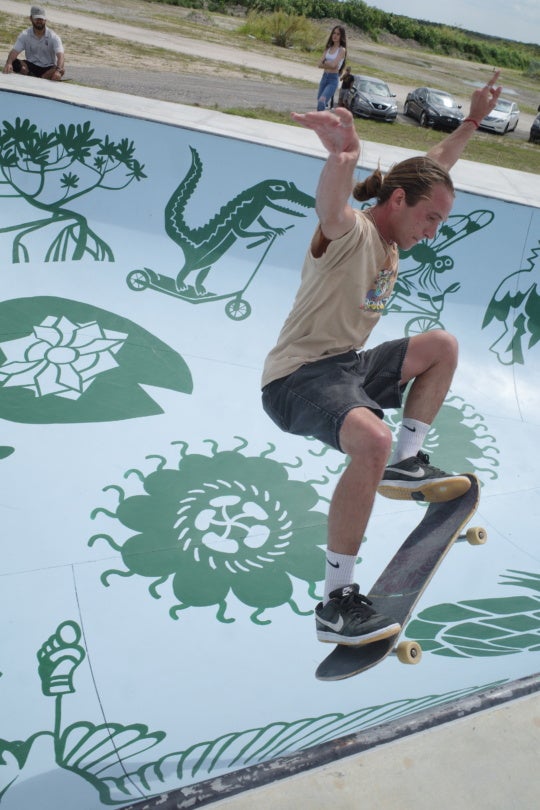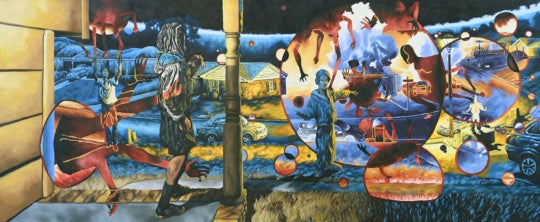[cont.]
He asked her what percentage of this “special 20%” was also left handed. He’d always heard left handedness was supposed to be a sign of special intelligence and creativity but only 10% of the population was left handed. She looked at him like she was startled he’d actually been listening and said she didn’t know. She liked it when he paid attention and asked questions. She never told him what he had to do or think; she just told him what she did, asked him to join her and if he didn’t, never criticized him. She left it up to him. She had no expectations of him, no preconditions. She believed in him. She loved him.
Being around Lori always calmed him. She had such nice skin and smelled like turpentine and jojoba oil. She fixed the best waffles on the planet. He bought six waffle irons in different shapes for her so she could have fun with them. One morning she made a small box out of waffles and stuffed it with sliced strawberries. The bottom waffle was soft and sweet by the time they ate it. So good. Diamond waffles covered with whipped cream. Clover waffles with mint jelly. He loved how cooking them made his place smell like slightly seared butter. Almost burnt toast. The smell stayed all day. And that overlay of honey. She liked honey, liked licking honey off him. She knew how to make him happy. Lori was the best part of life.
The next morning she was gone and it was like someone had altered the colors, reduced their saturation levels to grey. Like someone had closed the curtains. He sat up and stared at the wrinkles in the sheets where she had been. He felt so completely empty until he downloaded the images from his four tiny cameras, set at different speeds and f stops, and admired the distortions of color and shapes they had captured, the way Lori’s hair moved in and out of light. It’s all about expectations, he thought. We expect orderliness and see it, ignoring everything else. The camera, though, has no illusions, no agendas. It simply records. The camera saw like he saw on drugs. The camera was bound yet free.
At two o’clock, his gallery in New York called. They had pulled out his work from Tut’s gallery for him. He didn’t have to attend to that. He was supposed to be polite. He was supposed to tell them thank you. He said, “Whatever.” He didn’t really care. The snaps were only important until he took the next set and then they were only important until he took the next. He didn’t dwell. He didn’t think in series or bodies of work. He thought in terms of each evening and the time spent looking at what he hadn’t noticed or remembered from the night before, reliving it with better, wider vision. Documentary or mediated experience – was there really any difference?
Eight
Lori knew exactly how it had played out.
Teddy and Jody drove up the windy road to the private lake in their Mercedes. Teddy was always the one behind the wheel, always cursing any slow cars loudly through the open windows as he gunned past them. He liked to hear the tires squeal and watch his wife grab onto the door handle as the car raced around the curves. At the lake he always parked at an angle in the little dirt patch just off the main road, partially blocking the path. Teddy bounced out of the car to start his stretching exercises, chasing off the jays, cursing the ducks looking for handouts. Lori had seen him throw rocks at them but probably not that day because he was late and in a hurry to get started. While he stretched his hamstrings, Jody sat in the car with the door open to put on her orthotic walking shoes. She didn’t like to wear them because they made her feet look big but she’d had back problems and her doctor had strongly recommended them. They did help. She walked around the lake and Teddy jogged it three times every week when the weather permitted. Lori’s mother liked the lake, liked seeing the kingfishers and the large carp which stayed close to the shore, all with the snow capped mountains as a back drop. Jody usually ran into people she knew, other women her age mostly, and they would walk together talking about their children and grandchildren. She found it comforting, this continuity of generations. She would tell all of these women friends about her only child, who was such a success in the art world. If she hadn’t been walking, she would have shown them the latest reviews and catalogs. Her mother always insisted on having the catalogs. German, French, Japanese, English. Most of her friends’ children simply had jobs, weren’t creative or interesting at all. Jody made sure they envied her the talent of her daughter, the passion of her marriage. She relished their envy.
Her parents kept a schedule. Half way around the lake – that day it was murky and bloated from last week’s drenching – Teddy would pass her, sometimes throwing a kiss but usually ignoring everything except the stride. He was proud of his form. That day he didn’t pass her. She probably thought he’d gotten another pebble in his shoe. Or perhaps he ran into one of his chain-smoking buddies. He tended to jog slower with them. Jody complained that the men here didn’t take care of themselves or push as hard as he did. When her mother passed the boats tied to the paltry dock with its half rotten pylons, she must have started walking faster. And then she heard the howl of an ambulance. She couldn’t run. Her heart wouldn’t take that.
At the bend by the tall grasses, she saw him flat on the path surrounded by the EMS staff. One was pressing a stethoscope against his chest. Teddy looked limp. Jody must have thought she was going to die on the spot. She lived in constant fear that he would die before her.
One of the two guys by Teddy was still taking his pulse when she finally reached them. She was out of breath.
“Teddy,” she cried out.
“He’s going to be fine,” said the young man. “It might be a mild heart attack, but I don’t think so. We’re going to take him to the hospital for some tests to be certain.”
Lori was at Uncle Henry’s house with her cousins. Jody immediately called her and shrieked that Teddy had had a heart attack and Lori should rush over to the hospital. Jody didn’t tell her that Teddy was fully conscious and talking in coherent sentences. Nothing that happened to Teddy was minor.
By the time Lori rushed into the waiting room, Teddy was sitting in a wheelchair, waiting for a doctor. It wasn’t a dire emergency to the staff. His vitals were back to normal. The van full of kids in the bad accident got service first despite Jody badgering the nurses, frantically trying to get Teddy into a room so a doctor could examine him. Lori sat down, ignoring her mother’s cries to do something, wishing she had stayed with her uncle. She smiled wearily at the nurses so they would know she thought her mother was being histrionic too. Showing kindness to the nurses was usually a better route to good service than yelling at them or threatening to sue them for malpractice. Twenty minutes of listening to her mother rant, listening to the whole story of the collapse over and over, watching everyone in the waiting room move as far away as they could, she couldn’t take it anymore and grabbed her mother with both hands, begging her to calm down. Jody pulled free and slapped her so hard the nurse down the hall heard it. What else could Lori do at that point? She went over to her father watching all this and told him that Uncle Henry needed her. She walked through the automatic door with her mother yelling out what an awful, ungrateful child she was.




